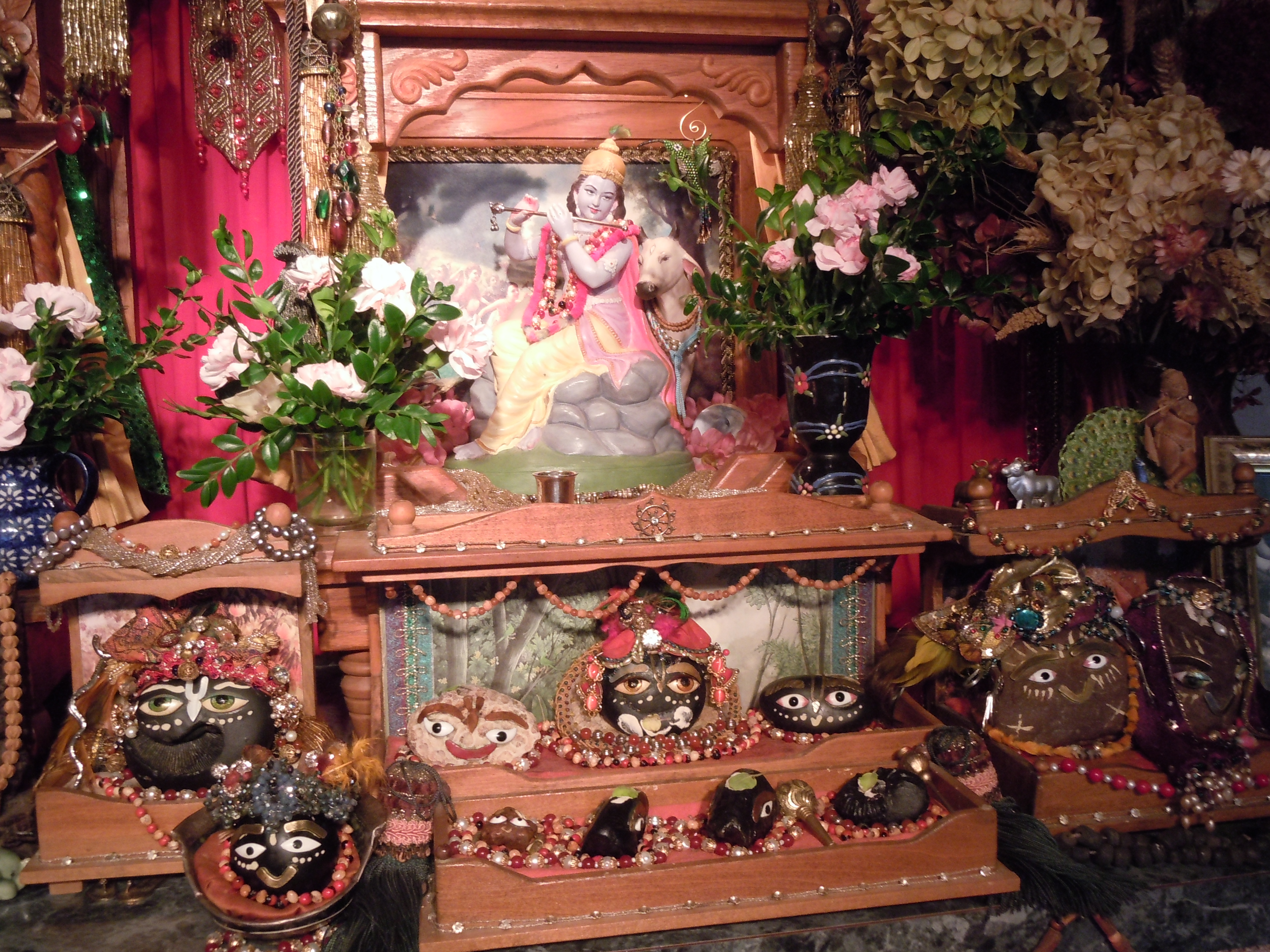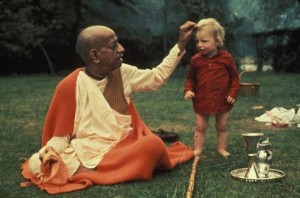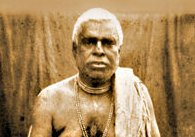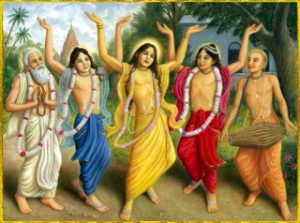Dec 8 1973 LA
So here it is explained what is Bhagavad-gītā. Gītaṁ bhagavatā. Bhagavatā means “by the Supreme Personality of Godhead,” and gīta means “spoken.” They say”sung,” you can say. But gīta means “spoken by.” Therefore it is called Bhagavad-gītā, “the instruction given by the Supreme Personality of Godhead personally.” Therefore it is called Bhagavad-gītā….
So if you want to understand Bhagavad-gītā, then we must understand in the same way as the person who directly heard from. This is called paramparā system. Suppose I have heard something from my spiritual master, so I speak to you the same thing. So this is paramparā system. You cannot imagine what my spiritual master said. Or even if you read some books, you cannot understand unless you understand it from me. This is called paramparā system. You cannot jump over to the superior guru, neglecting the next ācārya, immediate next ācārya. Just like our, this Gau…, Caitanya Mahāprabhu’s cult; we cannot understand Caitanya Mahāprabhu directly. It is not possible. We have to understand through the Gosvāmīs. Therefore you’ll find in the Caitanya-caritāmṛta and at the end of every chapter, the writer says,
śrī-rūpa-ragunātha-pade yāra āśa
caitanya-caritāmṛta kahe kṛṣṇa-dāsa
This is the process.
He does not say that “I’ve understood Lord Caitanya Mahāprabhu directly.” No. That is not understanding. That is foolishness. You cannot understand what is CaitanyaMahāprabhu. Therefore repeatedly he says, rūpa-ragunātha-pade… “I am that Kṛṣṇa dāsa, Kavirāja, who is always under the subordination of the Gosvāmīs.” This is paramparā system. Similarly, Narottama dāsa Ṭhākura also says, ei chay gosāi jār mui tār dās, “I am servant of that person who has accepted this six Gosvāmīs as his master. I am not going to be servant of any other person who does not accept the way and means of…” Therefore we say or we offer our prayer to our spiritual master, rūpānuga-varāya te, rūpānuga-varāya te, because he follows Rūpa Gosvāmī, therefore we accept, spiritual master. Not that one has become more than Rūpa Gosvāmī or more than… No. Tāṅdera caraṇa-sebi-bhakta-sane vās. This is the paramparā system.
Now here, the same thing is repeated: Arjuna, who directly heard from Kṛṣṇa. Sometimes some people say that “Arjuna heard directly from Kṛṣṇa, but we don’t find Kṛṣṇa in our presence, so how can I accept?“ It is not a question of direct presence, because you have no idea of the absolute knowledge. Kṛṣṇa’s words, Bhagavad-gītā, is not different from Kṛṣṇa. It’s not different from Kṛṣṇa. When you hear Bhagavad-gītā, you are directly hearing from Kṛṣṇa because Kṛṣṇa is not different. Kṛṣṇa is absolute. Kṛṣṇa, Kṛṣṇa’s name, Kṛṣṇa’s form, Kṛṣṇa’s quality, Kṛṣṇa’s instruction, everything Kṛṣṇa’s, they’re all Kṛṣṇa. They’re all Kṛṣṇa. This has to be understood.
Just like the South Indian brāhmaṇa. As soon as he opened his… He was illiterate, he could not read Bhagavad-gītā. But his Guru Mahārāja said that “You shall read every day eighteen chapters of Bhagavad-gītā.” So he was puzzled, that “I’m illiterate, I cannot… All right, take me the…, the Bhagavad-gītā.” So he was in a Rāmaṇatha temple. He took the Bhagavad-gītā and went like this. He could not read. So his friends who knew him, they were joking, “Well, brāhmaṇa, how you are reading Bhagavad-gītā?” He did not answer because he knew that his friends are “Joking me because I do not know… I’m illiterate.” But when Caitanya Mahāprabhu came, he was also puzzled, “Brāhmaṇa, you are reading Bhagavad-gītā?” He said, “Sir, I am illiterate. I cannot read. It is not possible. But my Guru Mahārāja ordered me to read. What can I do? I’ve taken this book.” This is trying follow guru’s word. He’s illiterate. He cannot read. There is no possibility. But his Guru Mahārāja ordered, “You must read Bhagavad-gītā daily, eighteen chapters.” Now what is this? This is called vyavasāyātmikā buddhiḥ. I may be quite incomplete. It doesn’t matter. But if I try to follow the words of my Guru Mahārāja, then I become complete.
This is the secret. Yasya deve parā bhaktir yathā deve tathā gurau [ŚU 6.23]. If one has strong faith in the Supreme Personality of Godhead and as much faith in the guru, yathā devetathā gurau, then the revealed scriptures become manifest. It is not the education. It is not the scholarship. It is faith in Kṛṣṇa and guru. Therefore Caitanya-caritāmṛta says guru-kṛṣṇa-kṛpāya pāya bhakti-latā-bīja [Cc. Madhya 19.151]. Not by education, not by scholarship, never says. Caitanya Mahāprabhu says, guru-kṛṣṇa-kṛpāya, by the mercy of guru, by the mercy of Kṛṣṇa. It is a question of mercy. It is not a question of scholarship or opulence or richness. No. The whole bhakti-mārga depends on the mercy of the Lord. So we have to seek the mercy. Athāpite deva padāmbuja-dvaya-prasāda-leśānugṛhīta eva hi, jānāti tattvam… [SB 10.14.29].Prasāda-leśa, leśa means fraction. One who has received a little fraction of mercy of the Supreme, he can understand. Others, na cānya eko ‘pi ciraṁ vicinvan. Others, they may go on speculating for millions of years. It is not possible to understand. So Bhagavad-gītā As It Is. Therefore we are presenting because we are presenting Bhagavad-gītā as it was understood by Arjuna. We do not go to Dr. Radhakrishnan, this scholar, that scholar, this rascal, that ra… No. We do not go. That is not our business. That is paramparā.
…. This is called paramparā. Evaṁ paramparā-prāptam imaṁ rājarṣayo viduḥ [Bg. 4.2]. So if we understand Bhagavad-gītā, as Kṛṣṇa…, as Arjuna understood. that is perfect. That is Bhagavad-gītā As It Is. And if you try to understand Bhagavad-gītā as some rascal commentator says, then you are reading somebody else; rubbish. There’s no meaning. You’re simply wasting your time. He may be such scholar, such big politician, like this. In our country, big politician, they have commented; big, big yogis, they have commented; big, big scholars they have… They’re all useless. Take it: useless. If you read such commentary of Bhagavad-gītā, it is simply waste of time. If you actually want to study Bhagavad-gītā, then as Arjuna understands. Arjuna directly listened from Kṛṣṇa.
… But one who cannot understand, one who thinks, “Oh, Kṛṣṇa is like us. He has got also two hands, two legs, one head. We have got also. He is like me,” he is a mūḍha, rascal. Therefore it is said in the Bhagavad-gītā, avajānanti māṁ mūḍhāḥ: [Bg. 9.11] “These rascal fools, they deride.” Mānuṣīṁ tanum āś… Paraṁ bhāvam ajānantaḥ, “They have no knowledge of the paraṁbhāvam.” So the paraṁ bhāvam, that is understood by the devotees. That is the difference. Budhā bhāva-samanvitāḥ, Kṛṣṇa has said. Budhā bhāva-samanvitāḥ [Bg. 10.8]. Paraṁbhāvam, this bhāva… Bhāva means assimilation—”Oh, Kṛṣṇa is so great.” This is called bhāva. That is real understanding, when you understand really this bhāva stage.Bhāva-bhakti. Bhāva-bhakti. Simply engaged in Kṛṣṇa’s service. Paraṁ bhāvam. Person who has not come to this stage of bhāva, he cannot understand Kṛṣṇa. Paraṁ bhāvam ajānantaḥ. The bhāva stage comes.
Everyone can attain that bhāva stage. There is process. This process is described by Rūpa Gosvāmī how to come to the bhāva stage. Bhāva stage means just prior to perfection. One must come to the bhāva stage, next stage is perfection. Next stage is full perfection. So how to come to this bhāva stage, that is Rūpa Gosvāmī has described, ādau śraddhā. First of all little faith. Just like many outsider also come here, “What these people are doing, these Kṛṣṇa consciousness men? So let us see.” So śraddhā. That is called śraddhā. Śraddhā, real śraddhā means complete faith. That is described by Caitanya-caritāmṛta. Śraddhā-śabde viśvāsa kahe sudṛḍha niścaya [Cc. Madhya 22.62]. One who has got this much faith, strong faith, that Kṛṣṇa is the Supreme Personality of Godhead, this faith, not flickering, firm faith, “Yes, Kṛṣṇa is the Supreme Personality…” That is called śraddhā. That is beginning of śraddhā. If you have got still doubt, then you have not come to the stage of śraddhā even. Superfluous. You may come, but when you actually believe that “Kṛṣṇa is the Supreme Personality of Godhead, and if I engage myself in Kṛṣṇa’s service, I am perfect”—two things—that is śraddhā. And the more you increase this śraddhā you become advanced. The beginning is this śraddhā. Ādau śraddhā.
So how this śraddhā, this faith can be increased? Sādhu-saṅga [Cc. Madhya 22.83]. If you keep yourself associated with the devotees, then this śraddhā can be increased. If you simply believe, “Yes, Kṛṣṇa is Supreme Personality,” but you do not live with the sādhus or devotee, then it will drop. It will finish. So just to keep the standard, the temperature right, you must keep always yourself warm. If you go away, then your (indistinct) is gone. Again you become cold. You see. This is the process.Ādau śraddhā tataḥ sādhu-saṅgaḥ [Cc. Madhya 23.14-15]. Everything is perfect. The first thing is that you must believe that Kṛṣṇa is the Supreme Personality of Godhead. Yes. And to keep this faith strong and going on, you must keep association with devotees. Otherwise whatever little faith you got, it will be lost. It become again under the clutches of māyā. Ādau śraddhā tataḥ sādhu-saṅgaḥ [Cc. Madhya 23.14-15]. And if you actually associate with sādhu, then the next stage is bhajana-kriyā, initiation, how to worship Kṛṣṇa. Then anartha-nivṛttiḥ syāt. If you are actually engaged in devotional service, anartha, which are not required, things will vanish. Just like we ask our students, “No illicit sex, no intoxication, no gambling, no meat-eating.” Simply by hearing it you cannot follow it. It is not possible. If you make bhajana-kriyā, if you’re actually following—chanting sixteen rounds—then you can follow the others. Otherwise, if you are spiritually weak, you cannot. The government is spending so much money to stop this intoxication, LSD, in your country. They’re all failure. But here, with our pure association, a person can give up immediately. Just see how much the association is strong. Ādau śraddhā tataḥ sādhu…, bhajana-kriyā [Cc. Madhya 23.14-15]. Anartha.
Then after one is free from these sinful activities, then he comes to the understanding stage. So long one is sinful, he has no possibility of understanding. Yeṣāṁ tv anta-gataṁ pāpam. One who is completely free from all sinful activities, anta-gatam, finished, yeṣāṁ tv anta-gataṁ pāpaṁjanānāṁ puṇya-karmaṇām. And how you can become free from sinful activities unless you act piously? Because we must have some engagement. If you have no pious engagement, then you cannot become free from sinful activities. You must act. If you do not act piously, then you must act viciously. This is the way. The Māyāvādī philosopher, they simply wants to stop impious activities. But they do not engage themselves in pious activities. Therefore they fail. They fail. You must have side by side. Paraṁ dṛṣṭvā nivartate [Bg. 9.59]. If you get something better, then you can give up inferior. But if you do not get better, you cannot give up the inferior. That is not possible.
So you can give up this impious activities provided you are engaged fully in devotional service. Otherwise it is not possible. Simply by moral instruction, that “Stealing is very bad. Don’t steal,” nobody likes it. Nobody likes it. It is practical. One man has stolen, and he’s arrested and he’s going to the police custody. So everyone has seen, and he has heard also that the government says that if you steal, you’ll be punished. In the Bible or in any other religious scripture it is said that stealing is not good. So he has heard it, and he has seen it that a man who has stolen, he is going to jail. So these two things are experienced: hearing and seeing. In spite of all his experience, why does he steal? Because he has no good association. He knows that stealing is bad; otherwise why he steals at night? Nobody can see. He knows he is doing some bad thing. But why he cannot give up that bad thing? Because he’s not associating with good person. That is it.
So association is so… Therefore we have named this Kṛṣṇa Consciousness Society. Not Kṛṣṇa consciousness only. Kṛṣṇa Consciousness Society. A society’s so beneficial we should understand. So, in this way, atha bhajana-kriyā anartha-nivṛttiḥ syāt. If we prosecute our devotional activities and keep our association with the devotees, then we can be free from sinful activities. And when you are completely free from sinful activities, then we get niṣṭhā. Yes, it is full faith. Niṣṭhā means full faith. Tato niṣṭhā. Tato ruciḥ. Ruci means taste. Why you are hearing about Kṛṣṇa daily, the same thing? We are speaking nothing new. “Kṛṣṇa is the Supreme Personality of Godhead, and you have to surrender.” This is our daily business. But why you are coming to see…, hear the same hackneyed words? Because it is very pleasing. This is called ruci, taste, “Yes, I want to hear this repeatedly. Yes. Kṛṣṇa is the Supreme Lord, I am the eternal servant.” You have got a taste. Unless one gets the taste, then you’ll say, “What is this hackneyed word?” Hare Kṛṣṇa, HareKṛṣṇa, twenty-four hours you can chant because you have got the taste. Others cannot do. This is called ruci. And ruci means āsakti, attraction: “I must go. I must chant. I must do.” Tato niṣṭhā, tato ruciḥ, atha āsaktiḥ. Tato bhāvaḥ. Then bhāva: “Ah, Kṛṣṇa. I will associate with Kṛṣṇa. Then Kṛṣṇa’s love, that is perfection.”
Some conclusions–
Srila Prabhupada starts out by saying we dont find Lord Krsna directly in our presence like Arjuna did, but he says we must understand that the Lord’s words from Bhagavad gita are the same as the direct presence as the Lord Himself . This he says has to be understood. Then he explains the param para system of each devotee working and serving under his current spiritual master, and not thinking I can jump over my guru and just do what some other guru in the param para gives as instructions. Then the basic instructions are given as to the actual process of becoming pure enough to associate directly with the Suprme Lord Himself. He is referring in this instance, to a particular verse given in the Nectar of Devotion by Rupa Goswami –
According to Bhakti-rasāmṛta-sindhu, the science of devotional service:
ādau śraddhā tataḥ sādhu-saṅgo ‘tha bhajana-kriyā
tato ‘nartha-nivṛttiḥ syāt tato niṣṭhā rucis tataḥ
athāsaktis tato bhāvas tataḥ premābhyudañcati
sādhakānām ayaṁ premṇaḥ prādurbhāve bhavet kramaḥ.
“In the beginning one must have a preliminary desire for self-realization. This will bring one to the stage of trying to associate with persons who are spiritually elevated. In next stage one becomes initiated by an elevated spiritual master, and under his instruction the neophyte devotee begins the process of devotional service. By execution of devotional service under the guidance of the spiritual master, one becomes free from all material attachment, attains steadiness in self-realization, and acquires a taste for hearing about the Absolute Personality of Godhead, Śrī Kṛṣṇa. This taste leads one further forward to attachment for Kṛṣṇa consciousness, which is matured in bhāva, or the preliminary stage of transcendental love of God. Real love for God is called premā, the highest perfectional stage of life.” In the premā stage there is constant engagement in the transcendental loving service of the Lord. So, by the slow process of devotional service, under the guidance of the bona fide spiritual master, one can attain the highest stage, being freed from all material attachment, from the fearfulness of one’s individual spiritual personality, and from the frustrations resulting from void philosophy. Then one can ultimately attain to the abode of the Supreme Lord.
Hare Krsna
damaghosa das




